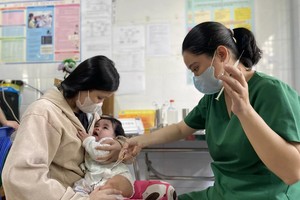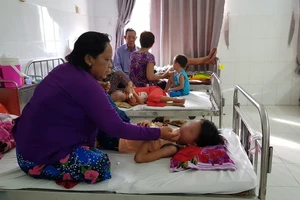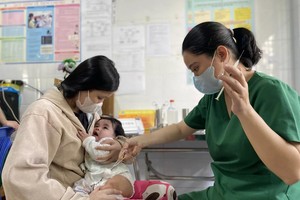
HFM, a contagious viral infection common in infants and young children, in the Mekong delta develops as per a certain period. Normally, the disease breaks out in early September and lasts to December. September and October have highest cases of infections.
Deputy Director of the Department of Health in Can Tho City of the Mekong delta Dr. Nguyen Trung Nghia said that by middle of October, Can Tho had 720 HFM infection cases. Districts of Cai Rang, Binh Thuy, Thot Not, Vinh Thanh have the most infection cases; most of them are kids under five.
In Can Tho Children Hospital, over 1,300 kids had hospitalized by middle of October. For instance, the hospital’s Infectious Ward received over 200 kid inpatients meanwhile the hospital has 70 beds; subsequently, the hospital converted lobby and canteen into treatment room.
Worse, two –four kids stayed in one bed.
Likewise, 77 cases of HFM were reported in September in Vinh Long Province but it escalated to 302 cases in middle of October. Most districts in the province recorded more cases of infections.
The peak season for the disease take place simultaneously academic year opening time in preschools while HFMD generally affects infants and children younger than 5 years of age. Accordingly, parents and medical workers have fretted the spread of the disease.
Dr. Nghia said without early detection, the disease will spread all kids in the schools; therefore, quarantine work in preschools is very important. So far, Can Tho authority has asked preschools to disinfect rooms, tables, desks and toys in educational institutions. Additionally, health sector in Can Tho keeps an eye on keeping personal hygiene and eating in preschools.
Teachers in preschools are required to monitor kids for early discovery of infection cases.
Because of patient overload in medical facilities, the disease develops unpredictably and cross-infection is at risk. Medical experts warned there has no vaccine against the disease. Parents should take their kids to infirmaries if they have symptoms of the disease.
























